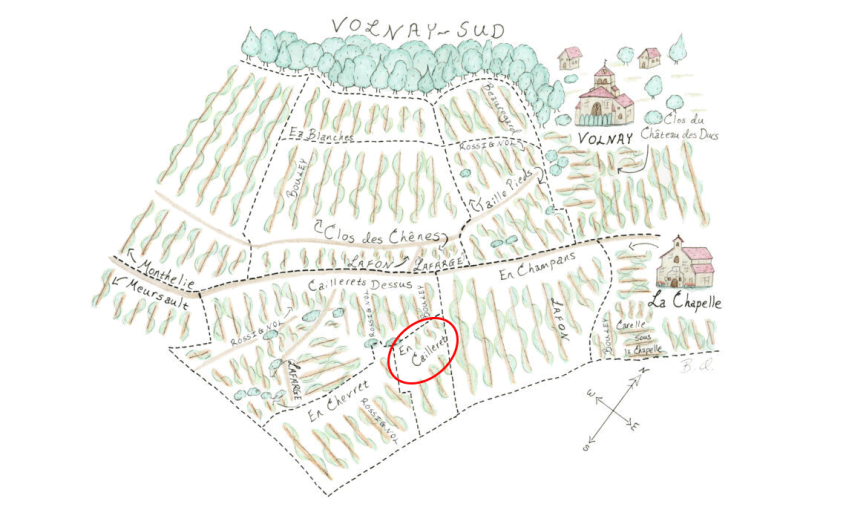Wines which epitomise ‘Iron fist in a velvet glove’.
The history of Volnay
Volnay is a village in the Côte de Beaune sub-region of Burgundy, renowned for making some of the smoothest, most delicate Pinot Noir wines of the southern Côte d’Or. It sits between Pommard (famous for its powerful reds) and Meursault (the home of rich whites). Volnay has been recognized as an appellation for red wine since 1937.
Over the centuries, the wines of Pommard and Volnay have alternately shared popularity, according to the fashions of the age. When powerful, full-bodied wines are in favour, Pommard enjoys the limelight. But when silkier, smoother wines are in demand, Volnay takes centre stage – as it did in the 17th and 18th Centuries.
Whilst in earlier times Volnay was made in a particularly light, early drinking style, these days there are many producers making wines which age extremely well.
The appellation’s wines are often referred to as being among the more supple structured of Burgundian reds and are contrasted with their more powerful and structured (in relative terms) neighbours, such as Pommard.
Volnay and its terroir
There are no Grand Cru vineyards, rather the best plots are classified as Premier Cru. There are a total of 34 Premier Cru sites. These vineyards of Volnay are located on the mid-slope of the Côte d’Or escarpment. Here, the vines benefit from well-drained, limestone-rich soils and a southeast-facing aspect which helps the plants to capitalize on the morning and early afternoon sunlight.
The Premier Cru vineyards sit in a band stretching across Volnay, from Pommard to Meursault, on the mid-slope of the Côte d’Or escarpment.
Les Caillerets – 1er Cru
Les Caillerets is a Premier Cru climat of the Volnay appellation in the Cote de Beaune. It is one of Volnay’s pre-eminent vineyards, due to the high quality of the terroir, which is well suited to Pinot Noir. Caillerets Premier Cru wine is subtle and elegant, but with good concentration and complexity alongside notes of spice and red berry fruits.
The vineyard also overlooks the lieu-dit vineyard of “Les Santenots Blancs” (part of Meursault’s wider Santenots vineyard) to the southeast. Monthélie’s Les Champs Fuillot borders Les Caillerets over the D973 road and around the slope to the northwest.
Les Caillerets gets its name (“The Small Pebbles”) from the light-reflecting stones which make up a distinctively high proportion of its soil. These are limestone dominant, particularly at the top of the slope, and offer excellent drainage. This means vines are forced to grow deep roots into the limestone to get hydration and nutrients, which lessens the vines vigour and yield and makes for small, concentrated berries, perfect for vinification.
vigour and yield and makes for small, concentrated berries, perfect for vinification.
The mesoclimate of the vineyard is made suitable for viticulture by the aspect which faces vines toward the southeast and consequently the rising sun. This provides enough sunlight to encourage slow, even ripening, whilst the grapes are shielded from the harsher afternoon sun. Acidity is retained in the berries as a result, bringing balance to the finished wine.
The small size of the Caillerets vineyard is one of the major reasons that these wines are not particularly well known: just a handful of producers (albeit some coveted names) regularly make wines here.
The wines
(all priced per 6x75cl in bond)
| Vintage | Name | Price | Scores |
| 2021 | Domaine Henri Boillot Volnay 1er Cru Les Caillerets | £450.00 | 93 BH |
| 2020 | Domaine Henri Boillot Volnay 1er Cru Les Caillerets | £460.00 | 94 BH |
| 2019 | Domaine Henri Boillot Volnay 1er Cru Les Caillerets | £460.00 | 93 BH |
| 2018 | Domaine Henri Boillot Volnay 1er Cru Les Caillerets | £415.00 | 93 BH |
| 2012 | Volnay 1er Cru Les Caillerets Ancienne Cuvée Carnot Bouchard Père et Fils | £275.00 | 92 NM |
To enquire about these wines, contact sales@nickollsandperks.co.uk


